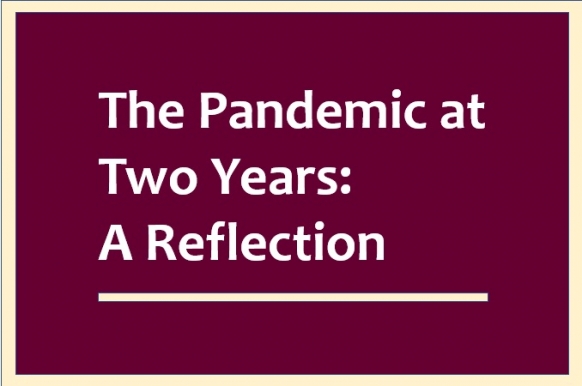The Pandemic at Two Years: A Reflection

Two years ago, when the World Health Organization declared COVID-19 to be a pandemic, few among us could have imagined the ways in which this global public health emergency would affect us as individuals and communities. Globally, we have witnessed the deaths of 6 million people and more than 450 million confirmed cases of COVID-19, and we have seen the heavy toll taken on families and communities. The pandemic also has transformed many of the patterns of daily life — from the steps we take to protect our personal health, to the ways in which we interact with others, to new styles of working — and it has given us a greater understanding of global health.
For CMB, an organization that relies upon collaboration, face-to-face exchanges, and candid discussions, the limited opportunities to gather in person have been a sharp departure from our past practices. Yet during these complex times, our history of collaborations and trust has never been more important. In an essay published in Lancet last year, CMB Trustee Jeff Koplan, together with three Chinese co-authors, emphasized the “great value in addressing the pandemic in partnerships, collegially, sharing information, being transparent, improving communications in accuracy and timeliness.” We are immensely grateful to our colleagues in Asia for a heritage of open dialogue and shared ideas, working together to address new and ongoing health challenges.
In early 2020, CMB consulted with Chinese and international partners on a science-based response to reduce threats to health workers and patients. In response, CMB arranged the procurement and donation of air-purifying devices to member hospitals in the China Consortium of Elite Teaching Hospitals; through a collaborative effort with Shanghai Jiao Tong University, personal protective equipment was donated to CMB’s partners in the United States. We also supported grants for capacity building in emergency preparedness and response, for studying COVID-19’s impact on the elderly in China, and for leadership training in health emergency response, and we introduced the Global Health Leadership Development Program to train young Chinese health professionals in global health research and practice – efforts that will not only benefit the current pandemic response, but also help prepare for future public health emergencies.
The Equity Initiative (EI), a program to support the career development of young health equity leaders in Asia, has been another venue to address the pandemic. In the early months of the pandemic, many of our EI Senior Fellows were implementing ground-level responses to COVID; together with the Atlantic Institute, we provided Solidarity Grants for Senior Fellows to scale up their work on the immediate public health response, aid to vulnerable populations, support for small and medium enterprises, delivery of mental health and psychological support, and other efforts. Many of our Fellows, through their writing and speaking, have drawn attention to the impact of COVID-19 on less visible populations, including remote communities, migrant workers, the elderly, and refugees. Their continued efforts throughout the pandemic, despite the enormous stresses of suffering personally from illness, family tragedies, and in some cases war and natural disaster, have been an inspiration to all.
Science has been one guide for CMB as we continuously evaluate the best course forward for our programs. I am grateful that we also have another strong guide – the counsel of our trusted colleagues in Asia – with whom we share the goal of improving the health and well-being of people everywhere.
Barbara J. Stoll, MD
President, China Medical Board
